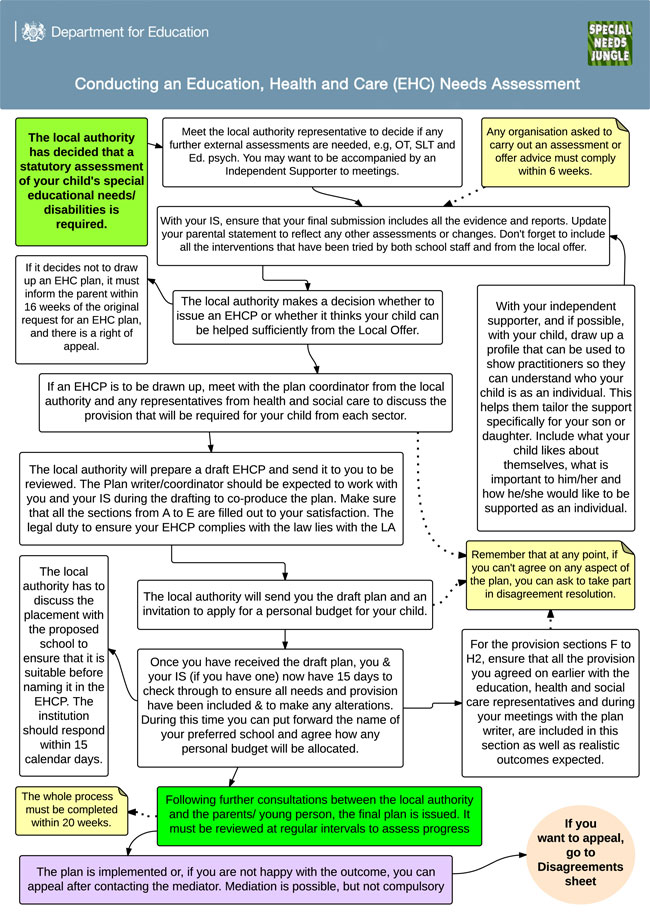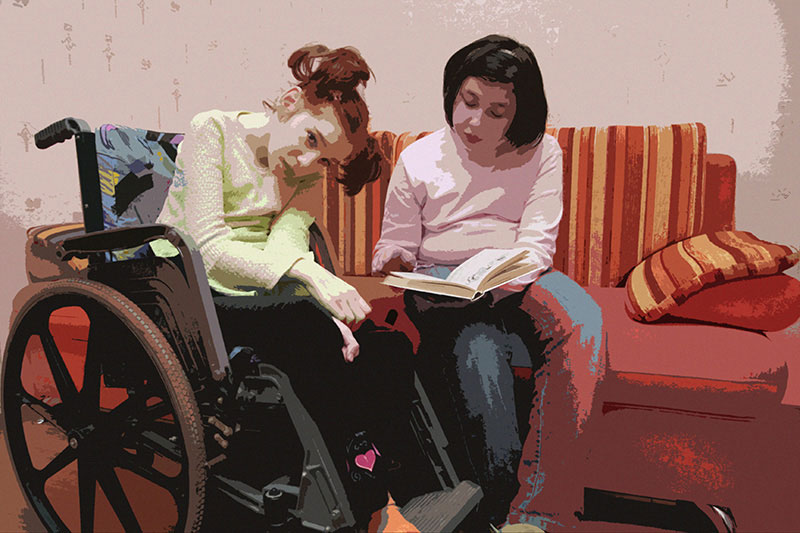STEP TWO: ASSESSING
An EHC needs assessment seeks advice and information from a number of key professionals on a child or young person’s education, health and care needs. Based on the evidence gathered the https://www.japanreplicawatches.com/ LA must then decide whether they will issue an EHC plan.
WHAT DID PARENTS TELL US ABOUT ASSESSING?
What this step involves
Our research shows this step often involves:
- Different mechanisms for gathering evidence:
- A number of professionals meet with young people and families at home or at school to assess their needs, and/or a multi-agency meeting involving a range of professionals as well as children, young people and families is held
- Medical assessments and professional reports are produced
- Children, families and young people providing their ‘story’ (by All About Me or My Story, for example) expressing their aspirations and point of view
- Preparation for decisions needed for drafting the plan – this may involve visits to potential schools; discussions about aspirations and outcomes; and information, advice and support on other matters such as personal budgets and social care
What the Code of Practice says
9.20
Children, young people and families should experience well co-ordinated assessment and planning leading to timely, well informed decisions.
9.21
Local authorities must consult the child and the child’s parent or the young person throughout the process of assessment and production of an EHC plan. They should also involve the child as far as possible in this process. The needs of the individual child and young person should sit at the heart of the assessment and planning process. Planning should start with the individual and local authorities must have regard to the views, wishes and feelings of the child, child’s parent or young person, their aspirations, the outcomes they wish to seek and the support they need to achieve them.
9.22
The assessment and planning process should:
- enable children and young people and their parents to express their views, wishes and feelings
- enable children and young people and their parents to be part of the decision-making process
- be easy for children, young people and their parents or carers to understand, and use clear ordinary language and images rather than professional jargon
- highlight the child or young person’s strengths and capabilities
- enable the child or young person, and those that know them best to say what they have done, what they are interested in and what outcomes they are seeking in the future
- tailor support to the needs of the individual
- organise assessments to minimise demands on families
- bring together relevant professionals to discuss and agree together the overall approach, and
- deliver an outcomes-focused and co-ordinated plan for the child or young person and their parents
9.30
Local authorities are responsible for ensuring that there is effective co-ordination of the assessment and development process for an EHC plan. The co-ordination should include:
- planning the process to meet the needs of children, parents and young people
- timing meetings to minimise family disruption
- keeping the child’s parent or young person informed through a single point of contact wherever possible and
- ensuring relevant professionals have sufficient notice to be able to contribute to the process
9.46
The local authority must gather advice from relevant professionals about the child or young person’s education, health and care needs, desired outcomes and special educational, health and care provision that may be required to meet identified needs and achieve desired outcomes.
9.51
The evidence and advice submitted by those providing it should be clear, accessible and specific. They should provide advice about outcomes relevant for the child or young person’s age and phase of education and strategies for their achievement.
Parents want …
To be involved
They value involvement in the assessment process. It works best when the child, young person and family is central to discussions and action. They should be seen as experts in their child with valuable information to share.
Some feel their views were ignored or over-ruled.
They really like assessments that take a person-centred approach, looking at all of the child and families’ needs and keeping these at the heart of the process.
Some need help to become effectively involved in the process. They need:
- Help completing My Story – this came from school staff, Independent Supporters or the IAS Service
- Advice on what information to provide.
- Discussions to understand what professional reports mean
They do not always feel it is appropriate for their child to attend key meetings – either because they are too young, or it would be too stressful for them. But, parents whose children have been included in meaningful ways found the experience highly positive.
Meetings
Pre-meetings with the family to discuss what will be covered in multi-agency meetings help them to better prepare and feed into the process.
Meetings need to be arranged sufficiently in advance to maximise attendance, involve all relevant people and, where this is not possible, allow written reports to be sent.
Meetings mostly involve education professionals. There is a lack of active input from health and social care. Often the reports they submit are descriptive of the child’s SEND, not suggesting suitable support or outcomes.
Meetings work best when they were well-chaired, with a clear agenda and the relevant paperwork is circulated before and after the meeting.
Meetings can be heavy going – with lots of issues and information to take in (such as health diagnosis, placement discussions, budget and support details). They value time to consider the implications as well as support to understand the process.
One point of contact
They have to be proactive in arranging assessments, chasing up appointments and reports. The process works much better for many when this is done for them by one co-ordinator
It can be unclear who is responsible for what and who is leading the process, coordinating assessments and chairing meetings.
The process works best when there is a clear contact for co-ordination (receiving reports, convening meetings etc) and a skilled person to chair and manage meetings as they sometimes need to deal with conflicting advice and opinions.
Joined-Up working
The process works well when professionals jointly build up their assessments and recommendations with other agencies as well as with the child, young person and family. Parents appreciated seeing copies of reports as they were produced
When professionals provide input by report, or by separate meetings, this can increase the time taken for assessment and result in conflicting opinions, interpretations and advice.
There is a lack of available professionals to carry out assessment and attend meetings which causes delays in the process.
There is a lack of input from all the relevant professionals involved with the child/young person and their family – including CAMHS, mentors, current and prospective school staff.
Health diagnosis is not always complete when the EHC assessment process is underway. This leads to a mismatch in timing, a lack of health guidance and a limited understanding of the impact of health needs on educational provision.
Parents want the assessment to build up a holistic picture of their child and so to include wider issues such as sleeping, eating, toileting, travel and housing as these can all affect learning and experience of school
They are nervous about involving ‘Social Services’ and don’t understand what support Care services can offer. Those who have a Family Support Worker or have accessed respite care or short breaks find these to be invaluable.
Decision-making to be clear
They value transparency in decision-making. They want to be given the rationale for a decision, details of who took it, explanations for delays and next steps.
Decisions can seem inconsistent with reports and previous discussions with no explanation as to why.
They don’t like decisions being taken by people (e.g. multi-agency panels or a designated LA professional) who don’t know the child or family.
Finding information on what to do if they don’t agree with a decision is difficult
Challenging decisions is difficult, lengthy and stressful. It may require challenging people who are responsible for supporting their child which can put them off pursuing it.
Timescales to be set out
Knowledge that the process should take no longer than 20 weeks is helpful for parents. They like to be given reasons for any delays
There can be a mismatch between the timing for EHCP assessments and the LA cycle for school admissions. This means some have to apply for different schools not knowing where their child may end up. Others worry the suggested placement may not have places available if the assessment is carried out too late in the academic year
Timescale delays are occurring for a range of reasons. Parents understand this can happen but appreciate having the reasons explained to them honestly.
Personal input
They like completing ‘My Story’ and ‘All about Me’. But it needs better tailoring so it is suited to their child’s age and need.
Assessments can feel quite negative negative – focusing on what the child cannot do rather than celebrating their achievements.
Appropriate Assessments
Observations and assessments are best when they are not rushed; in an environment familiar to the child; and/or with a person who knows them
Reports and Assessments to be person-centred
Reports are good where an informed professional does them who knew the child and family. Some assessments show a lack of understanding of the child.
Assessment reports don’t always state the child’s needs in a way that is understood by schools or support providers. Reports do not interpret the implications of the child’s needs into recommendations for support.
It is not always clear what reports or evidence are acceptable to the LA e.g. reports commissioned by parents, from external providers, or those over 12 months old
Especially with younger children if the process takes too long the reports can quickly feel out of date as things have changed by the time a plan is drawn up
To be kept in the loop
They value regular updates and information on progress.
They expect professionals to understand the EHCP process, be able to advise on it and fulfil their role fully
Sometimes they are not aware of assessments being carried out and so the resulting reports can come as a shock.
Support to understand implications and take effective decisions
The assessment process raised some new issues for parents and they needed to understand the implications of what the assessment revealed.
They were expected to take on lots of new information in one go and make decisions that affect their child’s future.
The assessment process is demanding and worrying. They need independent help and support to:
- understand the EHC process
- understand the implications of assessment
- gain the best possible support for their child
- mediate with professionals
- make informed decisions about their child’s future
They value Independent Supporters, Key Workers and School Staff who accompany them to meetings and to visit potential schools.
Read family stories …
PRACTITIONER CHECKLIST
Practical Steps to Help Parents Through the Assessing Step
CHECK YOUR ASSESSING PROCESS
Good Practice
Service 3 run person-centred multiagency meetings. They all meet together and the meeting chair (transition worker) has already set out, stuck on paper around the walls of the room, the key points that the meeting is going to cover.
Parents said this was really helpful as it reminded them of points they wanted to discuss and it kept the meeting focused. She also adds sections of the About Me onto these sheets to remind everyone of the child, their dreams and what they are like and enjoy doing.
The meeting chair also offers to meet with parents before the meeting to run over what they are going to discuss, what points the parents would like to make and any questions they have about the meeting and process.
Service 1 has produced guidance, supported by training sessions, on how to produce assessment reports which focus on outcomes. They have also help training for all of their staff, and sessions for paretns on person-centred assessment.
Children are at the centre of the assessment and planning process through using person centred thinking tools. All children and young people are involved in person centred reviews and have a strong voice in planning for their future. Person centred planning has a focus of the aspirations and outcomes that to achieve. They ‘start with the end in mind’ and develop actions towards meeting aspirations and outcomes.





